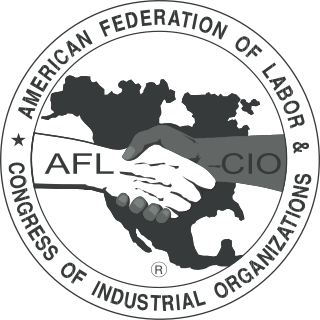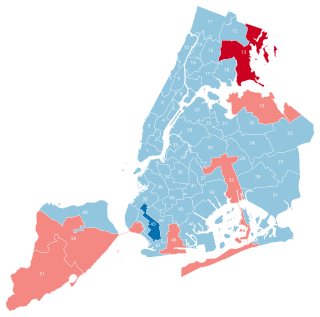
The American Federation of Labor and Congress of Industrial Organizations (AFL-CIO) is a national trade union center that is the largest federation of unions in the United States. It is made up of 60 national and international unions, together representing more than 12 million active and retired workers. The AFL-CIO engages in substantial political spending and activism, typically in support of progressive and pro-labor policies.

Service Employees International Union (SEIU) is a labor union representing almost 1.9 million workers in over 100 occupations in the United States and Canada. SEIU is focused on organizing workers in three sectors: healthcare, including hospital, home care and nursing home workers; public services ; and property services.

John Joseph Sweeney was an American labor leader who served as president of the AFL–CIO from 1995 to 2009.

Andrew L. Stern is the former president of the Service Employees International Union, and now serves as its President Emeritus.
The organizing model, as the term refers to trade unions, is a broad conception of how those organizations should recruit, operate, and advance the interests of their members, though the specific functions of the model are more detailed and are discussed at length below. It typically involves many full-time organizers, who work by building up confidence and strong networks and leaders within the workforce, and by confrontational campaigns involving large numbers of union members. The organizing model is strongly linked to social movement unionism and community unionism. The organizing model contributes to the discussion of how trade unions can reverse the trend of declining membership, which they are experiencing in most industrial nations, and how they can recapture some of the political power, which the labor movement has lost over the past century.

The Strategic Organizing Center (SOC), formerly known as the Change to Win Federation (CtW), is a coalition of North American labor unions originally formed in 2005 as an alternative to the AFL–CIO. The coalition is associated with strong advocacy of the organizing model. The coalition currently consists of Service Employees International Union (SEIU), the United Farm Workers (UFW), and the Communications Workers of America (CWA), the latter of which is affiliated with both the SOC and the AFL–CIO. Michael Zucker is currently listed as the Executive Director of the organization since 2020.
Justice for Janitors (JfJ) is a social movement organization that fights for the rights of janitors across the US and Canada. It was started on June 15, 1990, in response to the low wages and minimal health-care coverage that janitors received. Justice for Janitors includes more than 225,000 janitors in at least 29 cities in the United States and at least four cities in Canada. Members fight for better wages, better conditions, improved healthcare, and full-time opportunities.

Dennis Louis Serrette was an American civil and labor rights activist. He also was the New Alliance Party candidate for United States President in the 1984 presidential election.

Sara Horowitz is a founder of the Freelancers Union and a proponent of mutualism. She has been working for unions since age 18, when she held a summer internship at the International Ladies Garment Workers Union. She has worked for the UAW, CSEA, and SEIU, and she currently serves on the board of the Albert Shanker Institute. Under her direction, the Freelancers Union built a first-of-its-kind Portable Benefits Network in 2004 and launched the Freelancers Insurance Company in 2009, which provided health insurance to more than 25,000 New York freelancers before it was closed in 2014. In her work, Horowitz advocates for the role of mutualist organizations, including unions, cooperatives, mutual aid groups, and faith-based groups, as the foundation for the next labor economy and social safety net in the United States.
Bruce Nissen is a professor emeritus of labor studies and director of research at the Center for Labor Research and Studies (CLRS) at Florida International University (FIU). He also formerly directed that university's Research Institute on Social and Economic Policy (RISEP).
George Hardy was a Canadian-American labour leader who was president of the Service Employees International Union (SEIU) from 1971 to 1980. At the time of his death, SEIU had grown to become the fifth-largest affiliate of the AFL-CIO. Hardy was a vice president of the AFL-CIO from 1972 to 1980, and a member of its executive council. He was a former member of the Democratic National Committee and the California Democratic State Central Committee.

Workers United is an American and Canadian labor union which represents about 86,000 workers in the apparel, textile, commercial laundry, distribution, food service, hospitality, fitness and non-profit industries. It was established in its current form in 2009 and is affiliated with the Service Employees International Union (SEIU).

Mary Kay Henry is an American labor union activist who was International President of the Service Employees International Union (SEIU) from May 8, 2010 until her retirement on May 20, 2024. She was the first woman to lead the union. While serving with the union in California, she helped pioneer SEIU's use of card check agreements, non-traditional collective bargaining agreements, comprehensive campaigns, and system-wide health care organizing strategies. Henry was included on Time's 100 Most Influential People of 2020.
Stephen Lerner is an American labor and community organizer. He has organized janitors, farm workers, garment workers, and other low-wage workers into unions.

David Rolf is an American labor leader, writer, and speaker. He was the Founding President of Seattle-based Local 775 of the Service Employees International Union (SEIU), which represents health care workers, and formerly served as international vice president of SEIU. He is the author of The Fight for Fifteen: The Right Wage for a Working America about the movement by low-wage workers to earn a higher minimum wage, and A Roadmap to Rebuilding Worker Power. Rolf was a founder of the Fair Work Center in Seattle, Working Washington, The Workers Lab in Oakland, and the SEIU 775 Benefits Group.
Jonathan Rosenblum is a community and labor activist, writer and a union and community organizer based in Seattle, WA.

The 2021 New York City Council elections were held on November 2, 2021. The primary elections were held on June 22, 2021. There were several special elections for seats vacated in 2020 and early 2021; these special elections were the first to use ranked-choice voting in city council elections after it was approved by a ballot question in 2019 and the second to use ranked-choice voting since New York City repealed PR-STV in 1945. Due to redistricting after the 2020 Census, candidates also ran for two-year terms instead of four-year terms for the first time, stemming from the New York City Charter overhaul in 1989. Four-year terms will resume in the 2025 election after another two-year election in 2023.

The 2023 New York City Council elections were held on November 7, 2023, with primaries having occurred on June 27, 2023. Due to redistricting and the 2020 changes to the New York City Charter, councilmembers elected during the 2021 and 2023 City Council elections will serve two-year terms, with full four-year terms resuming after the 2025 New York City Council elections. Party nominees were chosen using ranked-choice voting.











